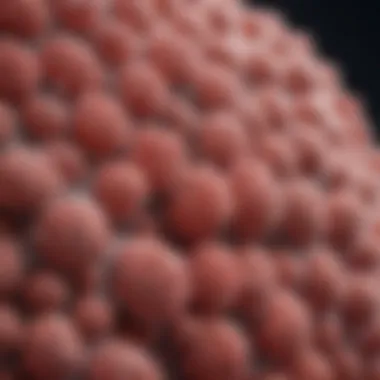Zinc's Impact on Cold Sores: A Comprehensive Guide


Intro
Cold sores, often a consequence of the herpes simplex virus, present a common concern for many individuals. These lesions can cause discomfort and self-consciousness, leading to a constant search for effective treatments. Zinc emerges as a compelling candidate in managing these outbreaks. Through various biological mechanisms, zinc aids in immune function, impacting how our bodies respond to viral infections. This article aims to explore the role of zinc in cold sore management, focusing on the connection between zinc supplementation, clinical evidence, and practical recommendations for those seeking relief from these outbreaks.
Key Takeaways
- Zinc has been shown to play a vital role in immune response and inflammation control, which is crucial when dealing with herpes simplex virus.
- Clinical studies indicate that zinc supplements may reduce the frequency and duration of cold sore outbreaks.
- The recommended dosage of zinc may vary based on individual needs and should be discussed with a healthcare provider.
Zinc supplementation is an important tool in enhancing immune functions, especially for managing cold sores related to the herpes simplex virus.
Key Statistics
- Approximately 67% of the global population is estimated to be infected with the herpes simplex virus type 1 (HSV-1).
- Studies show that zinc therapy can result in a 30-50% reduction in the duration of cold sore episodes.
Practical Tips
Incorporating zinc into your health routine can offer benefits beyond cold sores. Here are some actionable steps to consider:
- Zinc-Rich Foods: Include foods rich in zinc in your diet, such as meat, shellfish, legumes, seeds, nuts, dairy products, and whole grains.
- Supplements: Consider taking zinc supplements if dietary intake is inadequate. A conversation with a healthcare professional is important to determine appropriate dosage.
- Topical Zinc: Explore topical zinc preparations that may provide localized relief to cold sores without systemic effects.
Creating a habit of monitoring your zinc intake could foster better immune health and potentially lessen the impact of cold sore outbreaks.
Prologue to Cold Sores
Cold sores are a common yet often misunderstood health concern. They are caused by the herpes simplex virus, primarily type 1. Understanding cold sores is essential because they can affect physical appearance, cause discomfort, and lead to social anxiety. This section will provide valuable insights on what cold sores are, their causes, and the significance of management strategies such as zinc supplementation.
Definition and Causes
Cold sores, also known as fever blisters, are fluid-filled blisters that typically appear on or around the lips. The herpes simplex virus is the root cause, and it spreads through direct contact with an infected person. Various factors can trigger outbreaks, including stress, fatigue, illness, and exposure to sunlight. Once infected, the virus remains in the body in a dormant state, frequently resurfacing during periods of stress or weakened immune function.
These causes highlight the importance of managing cold sores effectively. For those who suffer recurrent outbreaks, understanding the triggers can help in implementing preventative measures. Additionally, addressing zinc's role in immune support could offer new options for management.
Symptoms and Signs
Symptoms of cold sores generally start with a tingling or burning sensation around the lips or the affected area. Within a few days, small blisters emerge, often accompanied by pain and swelling. The blisters can break open, ooze, and form a crust over time, healing usually occurs after about one to two weeks.
Recognizing these symptoms early can be crucial. Many individuals may not realize they are contagious until the blisters are present, thus increasing the risk of transmission. Understanding how to identify cold sore symptoms can strengthen one's approach to treatment and management, including making informed decisions about zinc supplementation.
Understanding Zinc
Zinc, a trace element, is crucial in many biological functions that impact overall health. In the context of cold sores, understanding zinc is essential. This section will discuss its biological role and the implications of zinc deficiency on health.
Zinc has been linked to various processes within the immune system, providing the body with the tools it needs to combat infections, including those caused by the herpes simplex virus. Furthermore, its deficiency can significantly alter immune responses, making individuals more vulnerable to viral infections. Therefore, recognizing the importance of zinc is a foundational step in managing conditions like cold sores effectively.
Biological Role of Zinc
Zinc plays a multifaceted role in human biology. It contributes to several enzyme activities that facilitate metabolic functions, synthesizes proteins, and promotes cellular growth and differentiation. Moreover, it is an essential cofactor for over 300 enzymes, crucial for biochemical reactions in the body. By enabling antioxidant activity, zinc also protects cells from damage caused by free radicals.
In terms of immune health, this mineral is known to modulate the activity of immune cells, including neutrophils and natural killer cells. These immune agents respond to infections, making zinc invaluable during immune challenges. As such, adequate zinc levels are vital to maintaining a well-functioning immune system, particularly when the body faces viral threats, such as cold sores.
Zinc Deficiency: Effects on Health
Zinc deficiency can lead to various health problems that extend beyond impaired immune function. Individuals with inadequate zinc levels may experience delayed wound healing, hair loss, or even taste and smell disorders.
The symptoms arise because zinc is pivotal for cell division and growth. A deficiency can exacerbate the severity and duration of viral infections, leading to more frequent outbreaks of cold sores. Consequently, understanding these effects is important for those looking to enhance their health and vigor.
- Common effects of zinc deficiency:


- Compromised immune response
- Skin lesions
- Increased susceptibility to infections
- Behavioral issues, such as depression or irritability
Zinc deficiency contributes to a broader range of health issues, especially in individuals with immune-compromised states.
Identifying the symptoms of zinc deficiency is vital, allowing for early intervention through dietary changes or supplementation. Effective management of zinc levels can lead to improved health outcomes, particularly in managing cold sores effectively.
Zinc and the Immune System
Zinc is a vital mineral that greatly impacts the immune system. Its importance cannot be overstated when it comes to managing health, especially during viral infections like cold sores, which are caused by the herpes simplex virus. A strong immune response is essential for combating various pathogens, and zinc plays a key role in both enhancing this response and modulating it, making it integral to overall health.
Zinc's Role in Immune Response
Zinc functions at multiple levels in the immune response. It is crucial for the development and activation of T and B lymphocytes, which are fundamental types of white blood cells involved in adaptive immunity. Zinc deficiency can impair these cells, leading to an inadequate immune response. Without sufficient zinc, the body may struggle to mount an effective defense against infections, including those from the herpes simplex virus.
Moreover, zinc serves as a structural component of various proteins involved in immune functions. It is essential for the maintenance of the integrity of the skin and mucosal membranes, acting as a barrier to pathogens. This is particularly significant in the context of cold sores, where the skin's defensive capabilities are directly challenged.
Additionally, zinc possesses antioxidant properties, which help combat oxidative stress during immune responses. This characteristic can reduce tissue damage following a viral infection and facilitate healing, speeding up recovery from cold sores.
Zinc is indispensable for promoting a balanced immune system, fostering both the response to infection and recovery.
Interaction Between Zinc and Viruses
Zinc has been shown to interact with various viruses, including the herpes simplex virus, either inhibiting their replication or affecting their ability to infect host cells. One hypothesis suggests that zinc can block the entry of viruses into cells, thereby diminishing the viral load and reducing the severity of infections.
Research indicates that zinc impairs the activity of viral proteins. These proteins are essential for the virus to reproduce and spread within the host. Furthermore, zinc can modulate the immune response, prompting the body to produce immune factors that target viral particles.
In laboratory settings, when zinc ions are present, studies have revealed a decrease in the replication of the herpes simplex virus. This provides compelling evidence for zinc's potential use as an adjunctive treatment in managing cold sores.
Zinc for Cold Sores: The Evidence
Zinc has gained attention for its potential role in managing cold sores, particularly those resulting from the herpes simplex virus. Understanding the scientific basis behind this claim becomes essential. Zinc is recognized for its importance in immune function. The mechanism by which it influences viral infections, including cold sores, forms a significant part of the discourse around zinc supplementation. This section will review clinical studies that highlight the evidence supporting zinc's effectiveness, thus offering valuable insights for health professionals and wellness coaches.
Clinical Studies Overview
Research efforts have delved into how zinc can impact the management of cold sores. Some studies indicate that zinc may inhibit the replication of the herpes simplex virus, which could effectively reduce the severity and duration of cold sore outbreaks.
- A study published in Journal of Investigative Dermatology showed that participants who used zinc sulfate showed a notable decrease in healing time compared to those using a placebo.
- Another clinical trial in Archives of Dermatology assessed the efficacy of topical zinc formulations and found significant benefits when applied at the onset of symptoms.
- The meta-analysis involving several randomized controlled trials offered a comprehensive evaluation of zinc supplementation, noting a favorable impact on recovery rates.
These findings suggest a promising connection between zinc and cold sore management, warranting further investigation into optimal supplementation practices.
Effectiveness of Zinc in Cold Sore Treatment
The effectiveness of zinc as a treatment for cold sores can be understood through various lenses, such as its antiviral properties and influence on immune defense.
- Antiviral Activity: Zinc exhibits properties that can inhibit viral replication, which is crucial for managing herpes simplex virus. When zinc comes into contact with the virus, it attaches to the viral membrane and potentially disrupts its lifecycle.
- Immune Support: Zinc's role in bolstering the immune response cannot be overlooked. Having adequate zinc levels may promote healthier immune function, allowing the body to respond effectively to infections.
- Topical Applications: Many individuals benefit from using topical zinc ointments directly on cold sores. Studies indicate that such applications can reduce pain and promote faster healing.
- Supplementation: For those experiencing frequent outbreaks, oral zinc supplementation might provide additional support. However, proper dosing is critical to avoid adverse effects.
"Zinc may play a pivotal role in minimizing the impact of herpes simplex virus and enhancing overall immune function."
Thus, professionals in health and wellness fields should consider zinc as a viable option in their recommendations for cold sore management.
Forms of Zinc Supplements
Zinc supplements have become increasingly popular as a method for enhancing health, particularly in managing conditions like cold sores. The various forms of zinc supplements available can significantly influence absorption rates, effectiveness, and individual response. Understanding these differences is vital for both health professionals and consumers when considering zinc as part of a treatment protocol for cold sores. Each form offers unique benefits and has specific considerations regarding dosage and potential side effects.


Zinc Gluconate
Zinc gluconate is a widely used supplement due to its good absorption profile. It is often favored in cold sore management because it is well-tolerated by most individuals. This form delivers elemental zinc in a soluble form that the body can easily use. Some studies indicate that zinc gluconate taken in lozenge form may help shorten the duration of cold sore outbreaks. It's particularly beneficial because it can be directly absorbed through the oral mucosa, allowing for faster effects. However, individuals should remain cautious and monitor their intake to avoid any gastrointestinal upset, which can occur in some cases.
Zinc Acetate
Zinc acetate stands out for its bioavailability, meaning it is efficiently absorbed in the body. This form of zinc is often used in the context of treating the common cold and has also shown promise for cold sores. Zinc acetate has been found to reduce the severity and duration of symptoms associated with herpes simplex virus infections. Often used in lozenge formulations, it can provide direct effects on the oral lesions with minimal systemic absorption. Nevertheless, individuals must adhere to recommended dosages as excessive intake could lead to toxicity and negative effects on health.
Zinc Picolinate
Zinc picolinate is another form noted for its higher absorption rates compared to other forms. It is often touted as being more effective in raising zinc levels in the body efficiently. Some users report experiencing fewer digestive side effects, making it a preferable option for those sensitive to other zinc forms. While there is less research specifically focused on zinc picolinate's effects on cold sores compared to gluconate or acetate, its superior absorption profile may make it a valuable addition for general immune support. Monitoring intake is important to prevent any adverse reactions, particularly if combined with other supplements or medications.
Dosage Recommendations
Understanding the correct dosage of zinc is crucial, especially when considering its role in managing cold sores. This section will discuss the recommended daily allowances, how zinc supplementation can influence cold sore outbreaks, and what factors should be taken into account for effective usage.
Recommended Daily Allowance for Adults
For adults, the Recommended Daily Allowance (RDA) of zinc varies slightly based on gender and age. Generally, adult men require about 11 mg per day, while adult women need approximately 8 mg. These values might increase for pregnant and lactating women to support additional nutritional needs.
Zinc can be consumed through diet or supplements. Foods rich in zinc include meat, shellfish, legumes, seeds, nuts, dairy, and whole grains. Understanding this baseline is essential for ensuring the body receives adequate zinc to maintain immune function and overall health, especially for those prone to cold sores.
Zinc Supplementation in Cold Sore Management
Zinc supplementation may be beneficial for individuals experiencing cold sores. While foods provide a natural source, supplements can ensure that the body reaches therapeutic levels of zinc which may be effective in managing herpes simplex virus activity. Dosages between 10 mg to 25 mg daily are often suggested for those looking to mitigate symptoms of cold sores. However, the optimal dosage can depend on individual health circumstances.
When considering supplementation, it is important to consult a healthcare provider. Overconsumption of zinc can lead to side effects, such as nausea and headaches, and could interfere with the absorption of other minerals like copper. Therefore, balance is vital.
"Starting with a lower dosage and incrementally increasing may help the body adjust without adverse effects."
In summary, knowing the recommended daily allowances and proper supplementation dosages is critical for anyone aiming to use zinc as a management tool for cold sores. This knowledge facilitates better decision-making regarding diet and supplementation, enhancing health outcomes.
Safety and Side Effects of Zinc
Understanding the safety and potential side effects of zinc supplementation is crucial when considering its use for managing cold sores. While zinc offers numerous health benefits, improper use or excessive intake can lead to adverse effects. This section aims to provide clarity on what health professionals, wellness coaches, and others need to be aware of regarding zinc's safety profile and potential interactions with other medications.
Potential Side Effects
Zinc supplements can lead to several side effects, especially when consumed in large amounts. It is essential to recognize these to ensure safe use:
- Gastrointestinal Distress: Common side effects include nausea, vomiting, and stomach cramps. These symptoms may occur with high doses, especially when taken on an empty stomach.
- Metallic Taste: Some individuals report a persistent metallic taste in their mouths after consuming zinc, which can be bothersome.
- Diarrhea: Zinc can also act as a laxative for some people, leading to loose stools.
- Copper Deficiency: Long-term high dosage can affect copper absorption, leading to copper deficiency, which can have serious health implications.
It is recommended that individuals not exceed the upper limit of 40 mg of zinc per day for adults to avoid potential toxicity.
Interactions with Other Medications
It is crucial to consider how zinc interacts with various medications. Some notable interactions include:
- Antibiotics: Zinc can reduce the absorption of certain antibiotics, such as tetracyclines and quinolones. It is advised that zinc supplements are taken at least 2 hours apart from these medications.
- Diuretics: Some diuretic medications may increase the excretion of zinc, potentially leading to lower zinc levels in the body. Regular monitoring may be necessary.
- Immunosuppressive Drugs: For those taking medications that suppress the immune system, such as corticosteroids, caution is advised as excessive zinc could interfere with their effectiveness.
- Other Supplements: Combining zinc with high doses of other minerals may lead to imbalances. It is critical to assess total mineral intake when using multiple supplements.
Understanding these interactions can prevent complications and enhance the overall effectiveness of zinc in managing cold sores. Health enthusiasts and wellness seekers should discuss their use of zinc with healthcare professionals to ensure safe and effective supplementation.


Natural Sources of Zinc
Zinc is an essential trace mineral important for many bodily functions. It plays a key role in the immune system and wound healing - both of which are critical in managing cold sores. Sufficient zinc intake might directly impact the body's ability to fight off the herpes simplex virus, potentially speeding up recovery and reducing the frequency of outbreaks. Therefore, understanding natural sources of zinc is vital for those looking to improve their zinc levels and overall health.
Foods Rich in Zinc
Several foods are particularly rich in zinc. Including these options in your diet can help ensure adequate intake:
- Oysters: These shellfish are among the most concentrated sources of zinc, significantly exceeding the daily requirement in just a few servings.
- Red Meat: Beef and lamb are also great sources. Lean cuts, especially from grass-fed animals, offer more than 5mg of zinc per serving.
- Poultry: Chicken and turkey have good levels of zinc. Dark meat offers a relatively higher concentration than white meat.
- Legumes: Beans, lentils, and chickpeas provide a plant-based source of zinc. However, they contain phytates that can inhibit zinc absorption, so combining them with vitamin C-rich foods can be beneficial.
- Nuts and Seeds: Pumpkin seeds, cashews, and hemp seeds are good options for those seeking non-animal sources.
- Dairy Products: Cheese and yogurt offer not just zinc but also proteins and calcium, making them wholesome choices.
- Whole Grains: While whole grains contain zinc, their absorption can be compromised due to the presence of phytates.
Incorporating these foods into daily meals can enhance zinc levels naturally and support your immune system.
Role of Diet in Zinc Intake
Diet plays a pivotal role in zinc intake and absorption. Many individuals do not meet the recommended daily allowance through diet alone, resulting in zinc deficiency. This can affect immune function, wound healing, and skin health - all of which are crucial when managing cold sores.
A well-rounded diet that includes a variety of zinc-rich foods can mitigate such deficiency. For instance, shifting towards a more plant-based diet can still be effective if one is mindful about food combinations. Consider adding legumes and nuts with vitamin C-rich fruits to enhance zinc absorption. Similarly, diversifying protein sources to include both animal and plant options is beneficial.
It’s also important to consider cooking methods. Some methods, like soaking and sprouting legumes, can reduce phytate content and enhance mineral bioavailability.
A balanced diet thrives on variety. It is essential to consume various food types to ensure a well-rounded nutrient intake, including sufficient zinc.
Complementary Treatments for Cold Sores
Cold sores, caused by the herpes simplex virus, can be uncomfortable and socially challenging for those affected. While zinc holds a significant role in managing these outbreaks, complementary treatments can enhance results and support overall healing. This section emphasizes the importance of integrating various approaches to cold sore treatment, focusing on additional nutrients and topical remedies.
Other Nutrients and Cold Sores
In addition to zinc, several other nutrients provide benefits when managing cold sores. Vitamin C is known for its immune-boosting properties. It plays a role in the production of collagen, critical for skin repair. Foods rich in vitamin C such as oranges, strawberries, and bell peppers can be beneficial.
Vitamin E is another nutrient that may help. It acts as an antioxidant, protecting cells from damage. Topical applications of vitamin E oil can soothe the affected area. It may not only reduce discomfort but also support faster healing.
Additionally, the amino acid lysine has gained attention. Some studies suggest that lysine can reduce the frequency and intensity of outbreaks. It is found in foods like dairy products, legumes, and meat. Consider incorporating these nutrients into your diet to support the body’s ability to manage cold sores effectively.
Topical Remedies
Topical treatments offer a direct approach to alleviate symptoms and promote healing. Various options are available, ranging from over-the-counter creams to natural ingredients.
- Abreva (Docosanol): This FDA-approved cream is effective in reducing the duration of cold sores when used at the first sign of an outbreak. It works by inhibiting the virus's ability to replicate.
- Lemon Balm (Melissa officinalis): Known for its antiviral properties, lemon balm can be applied topically as an ointment. It may help reduce symptoms and speed healing.
- Aloe Vera: This natural remedy is widely recognized for its soothing properties. Applying aloe vera gel can alleviate discomfort and promote skin recovery.
- Honey: Research suggests that honey possesses antiviral and anti-inflammatory effects. Applying it directly to the sore may reduce healing time.
Utilizing these topical remedies in conjunction with zinc supplementation may enhance overall treatment outcomes. It is crucial to approach cold sore management with a holistic mindset, considering both systemic and localized treatments. A well-rounded strategy can improve recovery times and lessen discomfort for those suffering from cold sores.
"Incorporating various treatment methods can significantly improve recovery outcomes for cold sores."
Understanding these complementary treatments allows individuals to tailor approaches based on their preferences and needs, creating a comprehensive plan for managing cold sores effectively.
Ending
The conclusion serves as a critical synthesis of the discussions on zinc's role in managing cold sores. This article has explored various aspects, including the biological role of zinc, its influence on the immune system, and the clinical evidence supporting its effectiveness against the herpes simplex virus. As we wrap up, it is essential to recognize that zinc supplementation may offer significant benefits for preventing and managing cold sores, especially for individuals prone to outbreaks.
Summary of Key Points
- Zinc plays an integral role in the immune system and helps combat viral infections, including those caused by the herpes simplex virus.
- Clinical studies have shown that zinc can reduce the duration and severity of cold sore outbreaks.
- Various forms of zinc supplements, such as zinc gluconate, zinc acetate, and zinc picolinate, can provide different benefits and absorption rates.
- Proper dosage is crucial; while a daily allowance exists, higher doses might be needed for therapeutic purposes in cold sore management.
- It is important to consider possible side effects and interactions with other medications when using zinc supplements.
Final Thoughts on Zinc and Cold Sores
In summary, the integration of zinc supplementation into the management of cold sores can be a promising strategy. The evidence supporting its benefits is accumulating, and many individuals could see improvements in their condition with appropriate use. It is vital for health professionals, wellness coaches, nutritionists, and fitness trainers to understand these elements. Educating clients about the power of zinc may enhance their overall approach to health and wellness. As with any supplement, personal health status, potential interactions, and the advice of healthcare professionals should guide zinc supplementation.
Zinc is not merely a nutrient; it is a potential ally in the quest for effective cold sore management.







